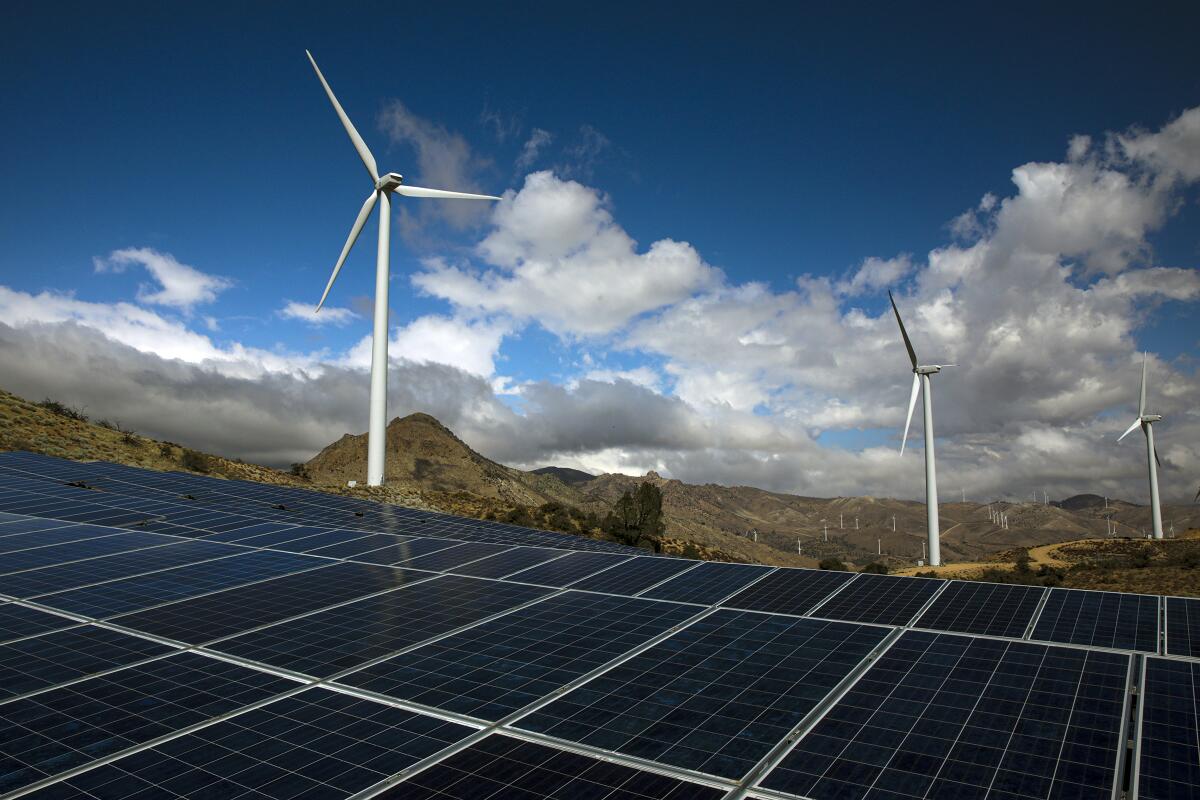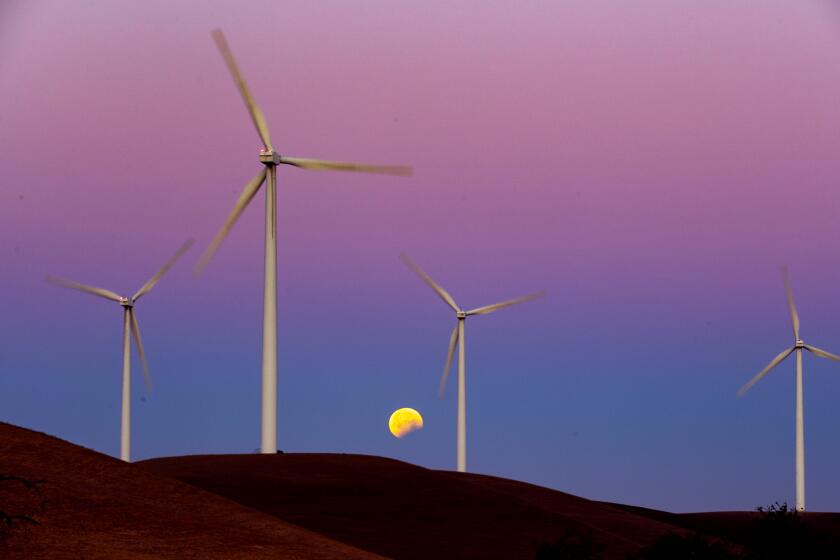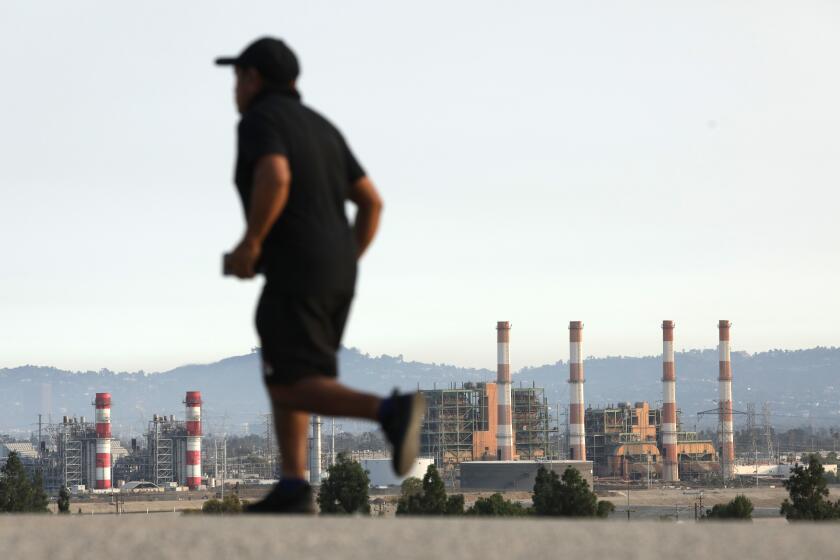Editorial: There’s little time left to save Earth from climate catastrophe. What U.S. politicians can do now

- Share via
The latest United Nations climate report couldn’t be clearer: We are at a planetary crossroads.
If we don’t act now to go beyond current pledges and cut fossil fuel emissions in half by 2030, it will be impossible to keep the heating of the Earth below a crucial 2.7-degree Fahrenheit limit and avoid increasingly severe devastation and suffering. We can still avert catastrophe, but there is only a narrow window left to end the era of fossil fuels.
In the Intergovernmental Panel on Climate Change report, scientists from across the globe spell out, in cautious yet exacting language, that what is blocking the replacement of dangerous fossil fuels with clean renewable energy is not technology, but politics.
“One factor limiting the ambition of climate policy has been the ability of incumbent industries to shape government action on climate change” and lobby more effectively than those who would gain from carbon-cutting policies, the report says.
Banning U.S. imports of Russian oil shows the inherent danger in our reliance on fossil fuels. The solution: Dramatically accelerate renewable energy.
Politicians, and the self-interested fossil fuel companies they serve, are the reason we are spiraling toward calamity. Wealthy countries like the United States, whose dumping of pollution into the atmosphere has done the most to cause the climate crisis, have a responsibility to take the lead, and our elected leaders need to overcome resistance from dirty industries.
There are steps President Biden and Congress can and should take immediately to spur the adoption of renewable energy, like wind and solar, electric vehicles, water heaters, heat pumps and battery storage, while taking on the oil, gas and coal industries whose products are fueling wildfires, storms, heat waves, drought, global instability and war.
Without any action from Congress, Biden can use his authority under the Defense Production Act to quickly ramp up the manufacturing and deployment of clean energy technology, including efficient electric heat pumps, which are air-conditioning like appliances that both heat and cool homes and will immediately reduce fossil fuel consumption by replacing models that burn climate-polluting natural gas.
L.A. is already suffering from the impact of climate change, but candidates for mayor don’t seem to have many new ideas for what to do about it.
Biden has already invoked the cold war-era law to encourage domestic production of critical minerals like lithium, nickel and cobalt that are used in electric vehicle batteries, and before that, to respond to the COVID-19 pandemic. And he banned imports of Russian oil and gas by executive order. The invasion of Ukraine has only underscored the global security imperative of ending our reliance on fossil fuels. If war and disease are reasons enough to warrant such action, the climate crisis is an even greater one.
Using defense powers to boost U.S. production of heat pumps at low cost has reportedly been studied by the White House. The idea has been gathering support among environmental groups and Democratic lawmakers as a way to respond to climate change and help Europe reduce reliance on Russian gas, similar to the “Lend-Lease” program that the U.S. used to help allies during World War II.
If Biden won’t act on his own, Congress should push him.
Children shouldn’t be forced to learn and play in hot, asphalt-covered, fenced-in campuses, especially in neighborhoods that already lack park space.
A bill introduced Wednesday by U.S. Reps. Cori Bush (D-Mo.), Jason Crow (D-Colo.) and Sen. Bernie Sanders (I-Vt.) would do that, using the Defense Production Act to increase domestic production of renewable energy technology. The Energy Security and Independence Act would “invest $100 billion in reinvigorating the domestic clean energy industrial base,” provide $30 billion to help weatherize and insulate 6.4 million homes and “$10 billion to procure and install millions of heat pumps, significantly reducing consumption of imported fossil fuels,” according to a summary from Bush’s office.
But lawmakers need to do more. They must find a way to pass key climate provisions from Biden’s all-but-dead Build Back Better Act, including renewable energy incentives for wind and solar and electric vehicle tax credits that would accelerate these zero-emission technologies. They can also get behind the Big Oil Windfall Profits Tax, a bill introduced last month by Sen. Sheldon Whitehouse (D-R.I.) and Rep. Ro Khanna (D-Fremont) that seeks to deter the petroleum industry from profiteering as gas prices surge by returning some of its revenues to consumers in quarterly rebates.
This kind of climate action may seem unlikely or even laughably ambitious, given the dysfunction in Congress, its failure to respond to decades of escalating warnings from scientists and the stranglehold of polluting industries. But if there ever were a time to press hard and go big to save our planet, it is now.
More to Read
A cure for the common opinion
Get thought-provoking perspectives with our weekly newsletter.
You may occasionally receive promotional content from the Los Angeles Times.













